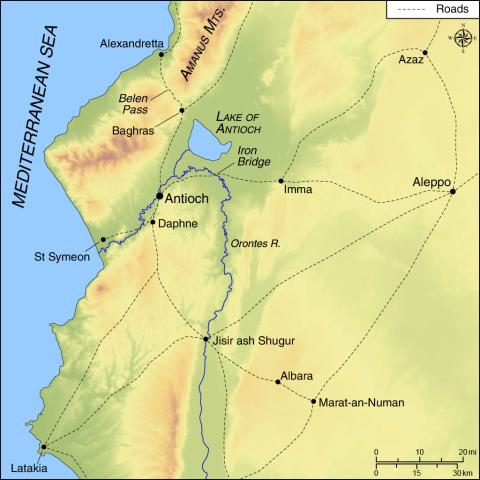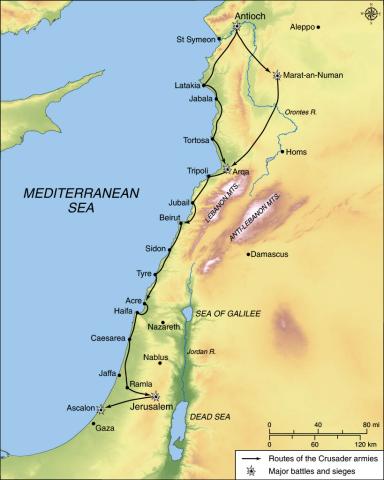The March to Jerusalem
[10.34.1] Boamundus autem nōn potuit apud comitem Sānctī Egidīī concordārī super id quod petēbat, īrātusque reversus est Antiochīam. Comes igitur Raimundus, nōn diū morātus, mandāvit—per suōs lēgātōs Antiochīae—ducī Godefridō et Flandrēnsī comitī ac Rotbertō Nortmannō et Boamundō ut ipsī venīrent ad Rugiam cīvitātem, loquī cum eō. Vēnēruntque illūc omnēs seniōrēs, fēcēruntque concilium quōmodo honestē possent tenēre viam Sānctī Sepulchrī, prō quā mōtī sunt et hūc usque perventum sit. Nequīvērunt concordāre Boamundum cum Raimundō, nisi Raimundus comes redderet Antiochīam eī. Nōluit comes ad hoc assentīre, prō fīdūciā quam fēcerat imperātōrī. Comitēs dēnique et dux reversī sunt in Antiochīam ūnā cum Boamundō. Comes vērō Raimundus reversus est ad Marram, ubi peregrīnī erant. Mandāvit quoque suīs mīlitibus honestāre palātium et castellum quod erat suprā portam pontis cīvitātis.
notes
(January 1099) Bohemond and Raymond of Toulouse continue to disagree about Bohemond's claim to control Antioch. The other leaders try to resolve the dispute but fail, and return to Antioch. Raymond returns to Marra, but orders that his strongholds in Antioch be fortified.
super id quod petēbat: Bohemond had asked for control of Antioch; the use of super to mean “about, concerning” is LL.
Antiochīam: accusative of place to which (AG § 427.2).
Antiochīae: “to Antioch”; technically locative, unless our author has suddenly switched to dative of place to which (AG § 428h).
ad Rugiam cīvitātem: Al-Ruj (see 10.33.1–2).
et hūc usque perventum sit: “and towards which they had marched until this time" (Hill).
concordāre: “bring to an agreement.”
ad Marram: Maarat al-Numan/Marat-an-Numan. (See ad Marram cīvitātem 10.33.1–2.)
ubi peregrīnī erant: i.e., those crusaders who had taken the city, followers of Raymond.
honestāre: “to fortify.”
vocabulary
concordō (1): to agree; to bring into union
hūc: to this place, hither
usque: this far, all this time
ūnā: together
honestō (1): to adorn, decorate; (ML) fortify


